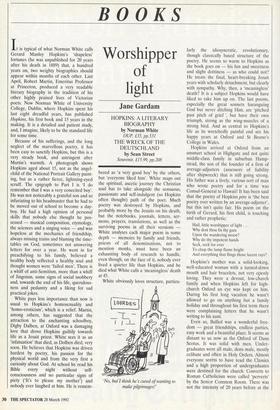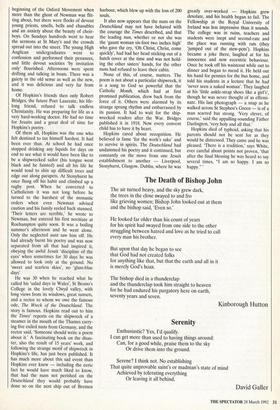BOOKS
It is typical of what Norman White calls Gerard Manley Hopkins's 'shapeless' fortunes (he was unpublished for 20 years after his death in 1889) that, a hundred years on, two weighty biographies should appear within months of each other. Last April, Robert Martin, Emeritus Professor at Princeton, produced a very readable literary biography in the tradition of his other highly praised lives of Victorian poets. Now Norman White of University College, Dublin, where Hopkins spent his last eight dreadful years, has published Hopkins, his first book and 15 years in the making. It is a detailed and patient study, and, I imagine, likely to be the standard life for some time.
Because of his sufferings, and the long neglect of the marvellous poetry, it has been easy to sanctify Hopkins, but this is a very steady book, and astringent after Martin's warmth. A photograph shows Hopkins aged about 15, not as the angel- child of the National Portrait Gallery paint- ing, but as a rather fierce, lightning-eyed scruff. The epigraph to Part I is 'I do remember that I was a very conceited boy'. He was not noticeably a grateful son and so infuriating to his headmaster that he had to be moved out of school to become a day- boy. He had a high opinion of personal skills that nobody else thought he pos- sessed — musical composition, etymology, the sciences and a singing voice — and was hopeless at the mechanics of friendship, always missing trains and blaming the time- tables on God, sometimes not answering letters for over a year. He went in for preachifying to his family, believed a healthy body reflected a healthy soul and thought women were 'failed men'. There is a whiff of anti-Semitism, more than a whiff of Jingoism, some signs of social snobbery and, towards the end of his life, querulous- ness and pedantry and a liking for sad practical jokes.
White pays less importance than now is usual to Hopkins's homosexuality and `homo-eroticism', which is a relief. Martin, among others, has suggested that the attraction to the enchanting schoolboy, Digby Dalben, at Oxford was a damaging love that drove Hopkins guiltily towards life as a Jesuit priest. White sees it as an 'infatuation' that died, as Dolben died, very soon. He believes that Hopkins was driven hardest by poetry, his passion for the physical world and from the very first a curiosity about God. At school he read his Bible every night without self- consciousness and no particular signs of piety ('It's to please my mother') and nobody ever laughed at him. He is remem-
Worshipper of light
Jane Gardam
bered as 'a very good boy' by the others, but `everyone liked him'. White maps out the spiritual, ascetic journey the Christian soul has to take alongside the sensuous, passionate and self-indulgent (so Hopkins often thought) path of the poet. Much poetry was destroyed by Hopkins, and probably more by the Jesuits on his death, but the notebooks, journals, letters, ser- mons, prayers, translations, as well as the surviving poems in all their versions — White analyses each major poem in some depth — memoirs by family and friends, priests of all denominations, not to mention monks, must have been an exhausting body of research to handle, even though, on the face of it, nobody ever lived a quieter life than Hopkins, and he died what White calls a 'meaningless' death at 45.
White obviously loves structure, particu-
'No, bull think he's cured of wanting to make pilgrimages!'
larly the idiosyncratic, revolutionary, though classically based structure of the poetry. He seems to warm to Hopkins as the book goes on — his fun and sweetness and slight dottiness — as who could not? He treats the final, heart-breaking Jesuit years with scholarly detachment, but clearly with sympathy. Why, then, a 'meaningless' death? It is a subject Hopkins would have liked to take him up on. The last poems, especially the great sonnets haranguing God but never ditching Him, are 'pitched past pitch of grief ', but have their own triumph, strong as the wing-muscles of strong bird. And as central to Hopkins's life as its wretchedly painful end are his happy years at Oxford and St Beuno's College in Wales.
Hopkins arrived at Oxford from an unsmart school in Highgate and not quite middle-class family in suburban Hamp- stead, the son of the founder of a firm of average-adjusters (assessors of liability after shipwreck) that is still going strong. His father was a lively, various sort of man who wrote poetry and for a time was Consul-General to Hawaii! It has been said that the poetry of Hopkins pere is `the best poetry ever written by an average-adjuster', but this isn't quite fair. His poem on the birth of Gerard, his first child, is touching and rather prophetic:
Hail, little worshipper of light ..
Why dust thou fix thy gaze Upon the wandering moon?
Why do thy impotent hands Seek, seek for ever To clasp the lamp flame bright And everything that flings those lucent rays?
Hopkins's mother was a solid-looking, well-educated woman with a turned-down mouth and hair bracelets, not very openly loving. They were a devout, low-church family and when Hopkins left for high- church Oxford an eye was kept on him. During his first long vacation he wasn't allowed to go on anything but a family holiday and throughout his first term there were complaining letters that he wasn't writing to his aunt.
Even so, Balliol was a wonderful free- dom — great friendships, endless parties, easy work and a beautiful place. It seems as distant to us now as the Oxford of Duns Scotus. It was solid with men. Under- graduates were all male, dons male, mostly celibate and often in Holy Orders. Almost everyone seems to have read the Classics and a high proportion of undergraduates were destined for the church. Converts to Roman Catholicism were called `perverts' by the Senior Common Room. There was not the intensity of 20 years before at the
beginning of the Oxford Movement when more than the ghost of Newman was flit- ting about, but there were flocks of devout young priests, smells, bells and chasubles and an anxiety about the beauty of choir- boys. On Sundays hundreds went to hear the sermons at St Mary's and the crowds spread out into the street. The young High Anglican undergraduates went to confession and performed their penances, and little devout societies `by invitation only' flourished. Afternoons were spent drifting and talking in boats. There was a gaiety in the old sense as well as the new, and it was delicious and very far from home.
Of Hopkins's friends then only Robert Bridges, the future Poet Laureate, his life- long friend, refused to talk endless Christianity. He was preparing for life as a very hard-working doctor. He had no time for Jesuits and a great deal of time for Hopkins's poetry.
Of them all, Hopkins was the one who felt destined to tax himself hardest. It had been ever thus. At school he had once stopped drinking any liquids for days on end to see what it would have been like to be a shipwrecked sailor (his tongue went black and he fainted) and all his life he would tend to shin up difficult trees and edge out along parapets. At Stonyhurst he once flung off his habit and climbed up a rugby post. When he converted to Catholicism it was not long before he turned to the harshest of the monastic orders when even Newman advised caution and his family reeled back stunned. 'Their letters are terrible,' he wrote to Newman, but entered his first novitiate at Roehampton quite soon. It was a boiling summer's afternoon and he went alone. Only the neglected aunt saw him off. He had already burnt his poetry and was now separated from all that had inspired it, obeying the awful Jesuit 'discipline of the eyes' when sometimes for 30 days he was allowed to look only at the ground. No 'sweet and scarless skies', no 'glass-blue days'
He was 30 when he reached what he called his 'salad days in Wales', St Beuno's College in the lovely Clwyd valley, with long views from its windows, great sunsets, and a rector to whom we owe the famous ode, The Wreck of the Deutschland. The story is famous. Hopkins read out to him the Times' reports on the shipwreck of a steamer in the mouth of the Thames carry- ing five exiled nuns from Germany, and the rector said, 'Someone should write a poem about it.' A fascinating book on the disas- ter, also the result of 15 years' work, and following the strange motif of shipwreck in Hopkins's life, has just been published. It has much more about this sad event than Hopkins ever knew — including the eerie fact he would have much liked to know, that had the nuns not perished on the Deutschland they would probably have done so on the next ship out of Bremen
harbour, which blew up with the loss of 200 souls.
It also now appears that the nuns on the Deutschland may not have behaved with the courage the Times described, and that the leading nun, whether or not she was the 'gaunt woman six-foot two inches high' who gave the cry, 'Oh Christ, Christ, come quickly', had had her head sticking out of a hatch cover at the time and was not hold- ing the other sisters' hands, for the other nuns had refused to leave their cabin.
None of this, of course, matters. The poem is not about a particular shipwreck, it is a song to God so powerful that the Catholic Month, which had at first promised publication, drew back from the force of it. Others were alarmed by its strange sprung rhythm and embarrassed by its passion. It had to wait for the ship- wrecked readers after the War. Bridges published it in 1918. Now every convent child has to have it by heart.
Hopkins cared about recognition. He believed in fame 'for the work's sake' and to survive in spirits. The Deutschland had undammed his poetry and it continued, but constantly on the move from one Jesuit establishment to another — Liverpool, Stonyhurst, Glasgow, Dublin, where he was
greatly over-worked — Hopkins grew desolate, and his health began to fail. The Fellowship at the Royal University of Ireland was less impressive than it sounds. The college was in ruins, teachers and students were inept and second-rate and the place was running with rats (they 'jumped out of the stew-pots'). Hopkins became a joke there, laughed at for his innocence and now eccentric behaviour. Once he took off his waistcoat while out to dinner and began to mend it. He held out his hand for pennies for the bus home, and told his students in a lecture that he had 'never seen a naked woman'. They laughed at his 'little ankle-strap shoes like a girl's', though he was never thought of as effemi- nate. His last photograph — a snap as he walked across St Stephen's Green — is of a man scarred but strong. 'Very clever, of course,' said the appalling-sounding Father Darlington, 'very holy and all that.'
Hopkins died of typhoid, asking that his parents should not be sent for as they would be distressed. They came and he was pleased. 'There is a tradition,' says White, ever careful about points not proven, 'that after the final blessing he was heard to say several times, "I am so happy. I am so happy."'



























































 Previous page
Previous page